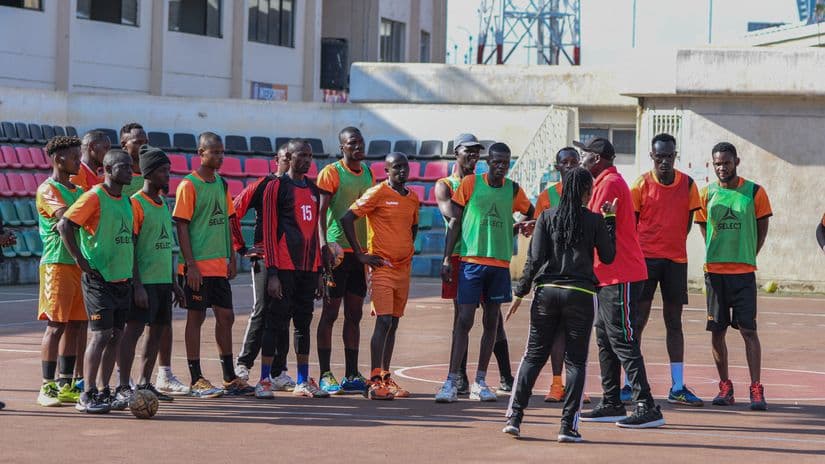We're loading the full news article for you. This includes the article content, images, author information, and related articles.
Riding a wave of experience and intensive preparation, Kenya's national deaf men's handball team is aiming for a historic medal finish at the upcoming 25th Summer Deaflympics in Tokyo, Japan.

Kenya's national deaf men's handball team is intensifying its training at Nyayo National Stadium in Nairobi with a clear goal: securing a medal at the 25th Summer Deaflympics, scheduled to be held in Tokyo, Japan, from Monday, November 15 to Wednesday, November 26, 2025, EAT. As the African champions, the team is not just aiming to participate but to make a significant impact on the world stage.
Head Coach Jack Habert has expressed strong confidence in his 18-man squad, citing the players' extensive experience and deep-seated chemistry as their core strengths. The team is largely composed of veteran players who have competed together for years, a factor Habert believes gives them a competitive edge. "This is why I am telling you I have confidence in this team because they know one another. They have the chemistry of play," Habert stated in an interview on Tuesday, October 22, 2025. The squad has been bolstered with the inclusion of five new, younger players to inject fresh energy.
The team's preparation has been rigorous and strategic. For the past two seasons, they have competed in the Kenya Handball Federation (KHF) Men's National League against hearing teams. This experience, though challenging, has been invaluable in honing their skills and resilience. In the last campaign, they finished 20th out of 25 teams, securing several impressive victories against the odds. Coach Habert noted the unique challenges his team faces, such as not hearing the referee's whistle, which makes their performance against hearing teams even more commendable. "If we can win some matches against the hearing sides then we are better," he remarked.
This domestic league experience is a crucial part of their long-term preparation strategy. "We started preparations a long time ago. Now we just need to polish the team to reach the Deaflympics standard," Habert explained. The focus has now shifted to increasing the intensity of their training to match the top-tier teams they will face in Tokyo.
Kenya will be making its second appearance in men's handball at the Deaflympics, having debuted in the 2022 Games in Caxias do Sul, Brazil, where they finished a respectable sixth. This built on their fifth-place finish at the 2018 World Deaf Handball Championships, also held in Brazil. These past international tournaments have provided crucial lessons that have been integrated into their current training regimen.
Team captain Joel Kiilu, appointed to lead the team for the first time in a major global event, is optimistic about their prospects. "We have really improved in our attack and generally our game. Our eyes are wide open, we are going to the Deaflympics much better, much improved, so I'm sure there is a medal coming home with us," Kiilu said on Tuesday, October 22, 2025. The team has been drawn in Group B alongside formidable opponents: Croatia, Serbia, and France. Group A consists of hosts Japan, Germany, Turkey, and Brazil. Despite the tough draw, the Kenyan squad remains unfazed.
The journey to Tokyo has not been without its challenges. Earlier in the year, Kenya's participation in the Deaflympics was in jeopardy due to an Sh18 million debt owed to the International Committee of Sports for the Deaf (ICSD). The debt, which stemmed from the failure to send teams to two international events, threatened to lock Kenyan athletes out of the Tokyo games. However, the Kenyan government intervened and settled the debt, allowing the Kenya Sports Federation of the Deaf (KSFD) to register its teams. This underscores the growing recognition and support for deaf sports within the country.
The performance of the handball team and the entire Kenyan contingent at the Deaflympics holds significant weight. Kenya has established itself as a powerhouse in deaf sports, finishing as the top African nation in the 2022 Deaflympics with a total of 24 medals (five gold, seven silver, and 12 bronze). A strong performance in Tokyo would not only bring glory to the nation but also continue to raise the profile of deaf sports in Kenya and inspire a new generation of athletes. The government's enhanced cash reward scheme for medalists provides an additional incentive for the athletes to perform at their best.
Keep the conversation in one place—threads here stay linked to the story and in the forums.
Sign in to start a discussion
Start a conversation about this story and keep it linked here.
Other hot threads
E-sports and Gaming Community in Kenya
Active 9 months ago
The Role of Technology in Modern Agriculture (AgriTech)
Active 9 months ago
Popular Recreational Activities Across Counties
Active 9 months ago
Investing in Youth Sports Development Programs
Active 9 months ago